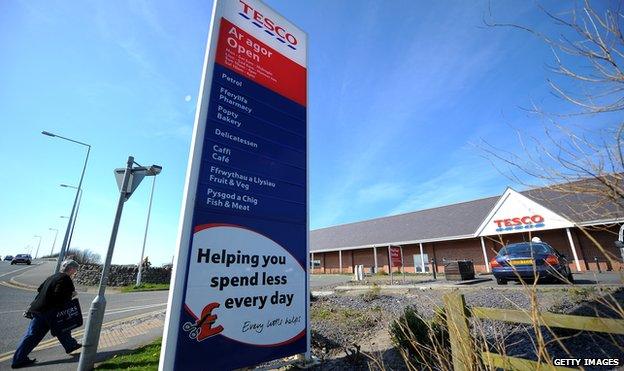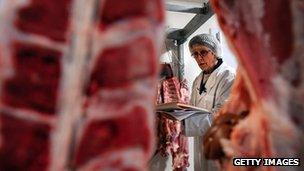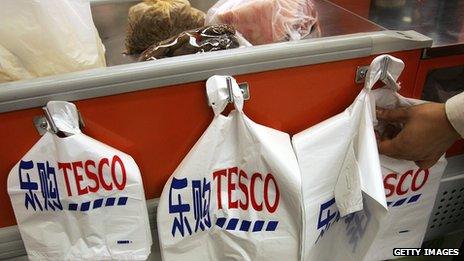What happened to Tesco's mojo?
- Published
- comments

Has Tesco lost its mojo? Its results for the first quarter of the year are not strong, and yet the first few lines of its press release try to imply that they are, which is not the sign of a confident business.
For example, Tesco starts its press release by saying that "customer perceptions" have improved "on all key measures" - which may well be so, but is not the same thing as money in the till.
It goes on to say that there were "positive and improving" like-for-like or underlying sales "in all food categories with the exception of frozen and chilled".
For the leading retailer of frozen and chilled food, that is a bit like saying my team Arsenal is brilliant in midfield, and ignoring some conspicuous shortcomings in defence and attack
The point is that, in the round, Tesco's like-for-like sales in the UK were down between 0.8% and 1.6% in the three months to May 26, depending on which of the four measures of underlying sales provided by Tesco you may think is relevant.

The memory of Europe's horsemeat scandal lingers
For what it's worth. Tesco seems to think that the 1% drop, excluding VAT and petrol, is the one that is relevant. That compares with a 0.5% rise in the final quarter of the last financial year.
So Tesco seems to have gone backwards again, in spite of the £1bn it spent in 2012/13 on recruiting 8,000 new store staff, relaunching thousands of own-label products and "refreshing" the look and feel of its stores.
The chief executive of Tesco, Philip Clarke, gave two explanations on the Today Programme for what had gone wrong.
Sales of consumer electronics were poor. Historically these have been important to Tesco but Mr Clarke has decided that Tesco will significantly reduce its presence in this market (you can probably hear Dixons breathing a huge sigh of relief).
And although no new bits of horse have been found in Tesco's ready meals in the latest period, the memory of equine DNA in the mince seems still to be making some shoppers wary of its chilled and frozen foods.
None of which is to say that Tesco is in serious difficulties, or that Mr Clarke will ultimately fail in stabilising Tesco.
But it does rather imply that the recovery is taking longer than expected. And it raises the possibility that he won't succeed.
What's more, even Tesco's operations in Asia and eastern Europe - which in recent years were the glittering jewels in its empire - have lost some of their lustre.

Tesco's market leadership in a handful of developing markets overseas remains an enormous source of strength for the group but it is striking that in the latest quarter like-for-like sales fell quite sharply in China, South Korea, the Czech Republic, Poland, Slovakia and Turkey (though the rate of decline in important South Korea has slowed).
But back to Britain.
Businesses, like all social organisms, rise and fall.
Tesco's market share of a third of the grocery market and more than 10% of all retail sales, acquired under Mr Clarke's predecessor, Sir Terry Leahy, put the retailing group in a league of its own, in Britain.
But possibly that supremacy was something of a historical anomaly, too far from the mean to be sustainable.
Maybe, in an inclement climate for all retailers in the UK, and given that Tesco is so big, the very best that can be expected of Mr Clarke is that at some point he stops it going backwards.